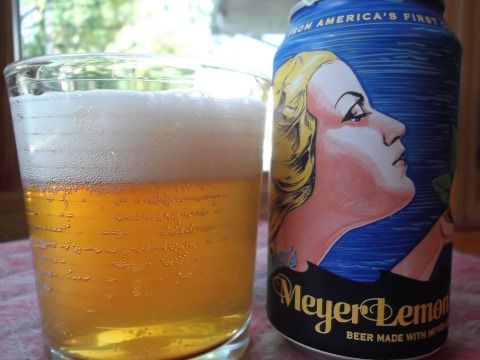
I had an Anchor Steam relatively recently and, oh man, was it good. It was one of the few microbrews in Madison taverns 25 years ago and having one again after a several year hiatus was a real treat.
Formed in 1896, San Francisco's Anchor can lay claim to being one of the oldest American craft breweries. It has a real Behind the Music history too with the brewery burning down multiple times, surviving the Noble Experiment, going into decline and slouching into the 1970s before rising like the Phoenix to become one of microbrewing's elder statesmen. They began brewing Liberty Ale – made with Cascade hops – back in 1975 and it stands as sort of a proto-American West Coast eyepah. Anchor is a storied and pioneering brewery.
After reacquainting myself with Anchor, I began to keep a closer eye on their spot on liquor store shelf and noticed their Meyer Lemon Lager. Was the titular Meyer one of the brewers? Or perhaps the brewmaster's hound? No. A cursory search turned up that it was a variety of lemon. Then I went and drank most of my six pack before discovering that it was actually a lemon-orange hybrid that originated in China and became popular in California by the mid-20th century with its sweeter, less tangy yet still lemony taste.
My hope going in was to have a good warm weather beer. You know, a crisp lager with some citrus zing and not too potent. At 4.5% A.B.V., Meyer Lemon Lager seemed to be perfect...on paper.
In my glass, Meyer Lemon Lager was a lovely gold color and a bit hazy as well. I think my photo exaggerates the haze because of the angle at which it was taken. I managed a big, fluffy, white head on my pour which lasted a long while. An effervescent brew, it was full of bubbles. A beauty of a beer, eh.
The aroma was led by – quelle surprise – lemon. This was followed by a cracker-like graininess as well as a faint encounter with spicy hops. Anchor notes that the beer has Cluster, Nugget, Steiner, & Experimental Hop No. 07270. I cannot find evidence of a hop variety called "Steiner" although a company called S.S. Steiner has a hop called Experimental No. 07270 so perhaps this is just an instance of poor copy editing. In that case, the Nugget and Experimental Hop No. 07270 were used in dry hopping and so should be most prominent in the smell. I didn't catch much of a hop smell but it seems that Experimental Hop No. 07270 is spicy.
So what does a Meyer Lemon taste like beyond the Wikipedia description? Well, a lot like a lemon, to my taste, although it did have a patina of orange. It didn't really taste sweet to me – in this beer, anyway, but it was less sharp tasting, less tart. In addition to liking the taste of the Meyer lemon, I also appreciated how much of it ended up in the beer. It was a Three Bears kind of thing: not so much as to drown out the nice biscuity malt flavor nor too little so that it was relegated to the background in a purely ornamental role. Indeed, it was just the right amount.
I wasn't able to discern any of those Cluster hops. Not being familiar with them, I wasn't sure what to be on the look out for. Apparently they are like grapefruit and pine so I can definitely understand how those flavors could get lost in lemon.
The lemony zing slowly faded on the finish where I was finally able to taste hops. The citrus tartness never disappeared but was overshadowed by grassy/spicy hops which made for a dry, slightly tart finale. My empty glass was left with some really nice lacing. Strands thick and thin were in abundance.
Anchor hit the nail on the head here. I wanted a good summer thirst quencher and they delivered. The folks in San Francisco whipped up a good, crisp pale lager and mixed it with just the right amount of citrus fruit flavor. The Meyer lemon has a bracing tartness to it but not mouth-puckeringly so. Tasty and refreshing; a wonderful summer brew.
Junk food pairing: Go get yourself a bag of Lay's Chinese Szechuan Chicken potato chips to go with your Meyer Lemon Lager. The Meyer lemon originated in China and San Francisco has a large Chinese/Chinese-American population. Plus the chips have a nice soy-garlic base that's highlighted by the mellow burn of pepper and that mixture complements the citrus of the beer perfectly.
No comments:
Post a Comment